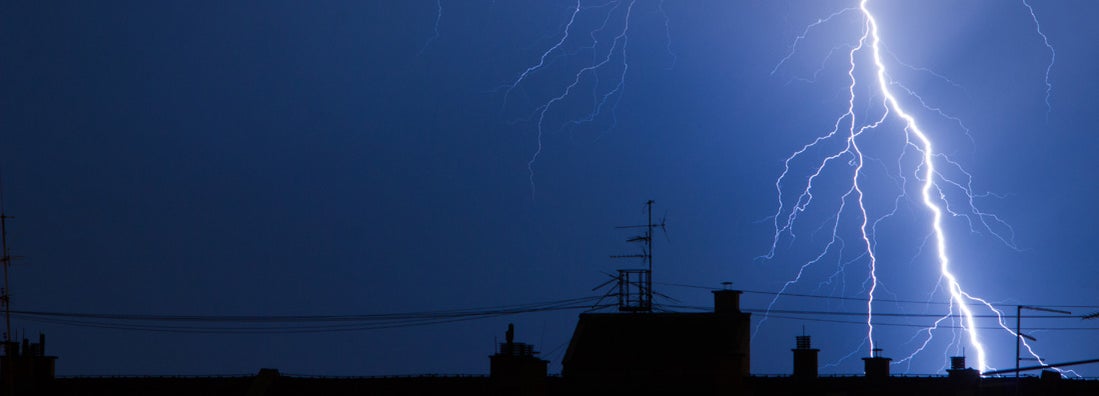Can a Roof Antenna Be a Lightning Hazard for Your Home?

Obscure and unusual things happen every day, and as a homeowner you have every right to wonder if the antenna hanging out on your roof is at risk of being struck by lightning. And if such an event should happen, who's responsible to pay for the damage, you or your insurance? We'll tell you, and we'll tell you if you're covered.
Luckily, an independent insurance agent can help you find protection against random acts of Mother Nature In addition to many other risks. They've handled all sorts of claims and know exactly what type of protection you need before you ever need it. Here's how they can protect you and your home against a roof antenna attack from the skies.
Is a Big Antenna on My Roof a Lightning Hazard?
If you've heard that the antenna on your roof can't be struck by lightning or that it will protect your house from being struck, both are big old myths. Roof antennas are not grounded, which not only make them an easy target for lightning strikes, but the current from the lightning can move the antenna and provide an entryway for the lightning bolt to get deeper into your house.
Okay, but what are the odds that your house will be struck by lightning? They're actually pretty high. Every year, one in 200 homes are struck by lightning. Having your home struck by lightning is not cheap. In 2019 alone, more than $900 million in lightning claims were paid out by home insurance companies. That is more than a 1.2 percent increase from previous years, which is credited to the increase of smart homes and the variety of electronics that provide an easy gateway for lightning. Guess what? A huge antenna on your roof is one of those gateways.
Homeowners Insurance Claims and Payout for Lightning Losses, 2017 to 2019
| Year | Number of claims | Average cost per claim | Value of claims ($ millions) |
| 2017 | 85,020 | $10,781 | $916.6 |
| 2018 | 77,898 | $11,668 | $908.9 |
| 2019 | 76,860 | $11,971 | $920.1 |
| Percent change | |||
| 2018-2019 | -1.3% | 2.6% | 1.2% |
| 2017-2019 | -9.6% | 11.0% | 0.4% |
Source: Insurance Information Institute.
Will My Homeowners Insurance Do Anything if Lightning Strikes My Antenna?
A strike from lightning can damage your roof, electrical wiring, appliances, and personal property. It can also start fires and even injure people in your home. The good news is your standard homeowners insurance policy will help pay for the damage if the angry skies decide to hit the big antenna on your roof. It will not only cover damage to the structure of your home but also your personal property like appliances, electronics, and furnishings at their cash value. It will even cover your additional living expenses if the lightning strike displaces you from your home.
How Does Property Coverage Help with Lightning Strikes?
A standard homeowners insurance policy includes property insurance coverage. Property coverage includes three types of coverage — replacement costs, actual cash value, and extended replacement costs should a covered peril damage the structure of your house and its contents. Lightning is one of the many perils covered under property insurance.
Like with most insurance, if you need to file a claim, you'll be responsible for the deductible on your insurance plan and any costs that exceed your limits. Most property coverage is 10% of your home's total value, so if the damage was more than 10% of your home's value, you could have to pay for some repairs out of pocket. Of course, you can work with your independent insurance agent to increase your coverage limits at any time.
What Happens if Someone Is Injured by the Lightning Strike?
If your friends are sitting in the living room watching TV when lightning strikes, there's a chance that someone will be injured. In this case, your homeowners liability insurance would protect you in the event that your friend decides to sue you. Liability insurance covers any legal fees and medical bills associated with a third-party injury claim against you. As long as the person was injured by a covered peril, like lightning, you'd be protected.
Can Umbrella Coverage Help Me in This Situation?
Depending on your home and other factors, you may want to consider umbrella coverage to help extend your liability limits. The important thing to know about umbrella coverage is it only applies to your liability limits. So if you're worried that damage from a lightning strike is going to cost more than your property coverage limits, you'll want to work with your independent insurance agent to raise the limits on your property coverage limits. If you're worried about people getting injured on your property, you have the option to add up to an additional $1 million in liability coverage under an umbrella policy.
What Precautions Can Be Taken to Minimize Risk of Lightning Starting a Fire?
As with most risks, certain precautions can be taken that will greatly minimize your chances of lightning striking your roof antenna and starting a fire. For a roof antenna, the biggest adjustments you can make involve protecting your antenna at all the places it can be exposed. There are three spots to secure:
- Ground the connection at the antenna: All of the wires for the antenna including the antenna, mast, lead-in, control, and rotator wires should be connected to a ground rod in the main ground via the shortest route possible.
- Secure the antenna at the entrance to the house: It's best if your antenna coax enters the house at a single point of entry. This means as close to the cable TV wires as possible. In addition, you should ground all data and control wires as directly as possible to the ground rod.
- Secure the antenna at the television: Use a high-quality surge protection device to protect your power supply and any antenna wires that are connected to your antenna.
It's also important that you work with a professional to install your roof antenna. They can assure that the antenna is properly grounded and that you're at minimal risk of having a lightning strike into your home through your antenna.
What Other Home Insurance Claims Do Homeowners Need to Worry About?
Lightning strikes are not the only risks that homeowners have to consider. In fact, 98% of home insurance claims are property damage as a result of a variety of perils. Many of these are much more common than your home being hit by lightning. Fortunately, all of the following common home insurance claims are also covered under the property damage coverage in a standard homeowners policy.
- Fire
- Theft
- Vandalism
- Building collapse
- Sinkhole collapse
- Automatic sprinkler leakage
- Falling objects from the sky
- Volcanic action
- Most explosions
- Windstorms/hail
- Accidental fire and resulting smoke damage
- Riot/civil commotion
- Certain types of water/other liquid damage
An independent insurance agent will help to consider all risks unique to your home and ensure that you get set up with all the property damage coverage you could ever need. They’ll also be able to review your specific insurance policy and spot coverage gaps in any areas of concern. If you’re lacking protection in an area, they’ll help to patch those holes.
What about Extra Endorsements? Do I Need Them?
Endorsements are a great way to protect your home from events that are not covered in your standard homeowners policy. This includes things like flooding and earthquakes. If you live somewhere that is prone to these incidents, it's worth talking with your independent insurance agent about different endorsements you should consider. Some common homeowners endorsements include:
- Flood insurance
- Earthquake insurance
- Sewer backup coverage
- Personal property coverage for jewelry and expensive personal items
Here’s How an Independent Insurance Agent Would Help
Protecting your home from lightning and other potential disasters is an important part of being a homeowner. That's why an independent insurance agent is great for making sure you have the coverage you need. They search through multiple carriers to find providers who specialize in home, auto, boat, and many other types of insurance. They can deliver quotes from a number of different sources and help you walk through them all to find the best blend of coverage and cost.
